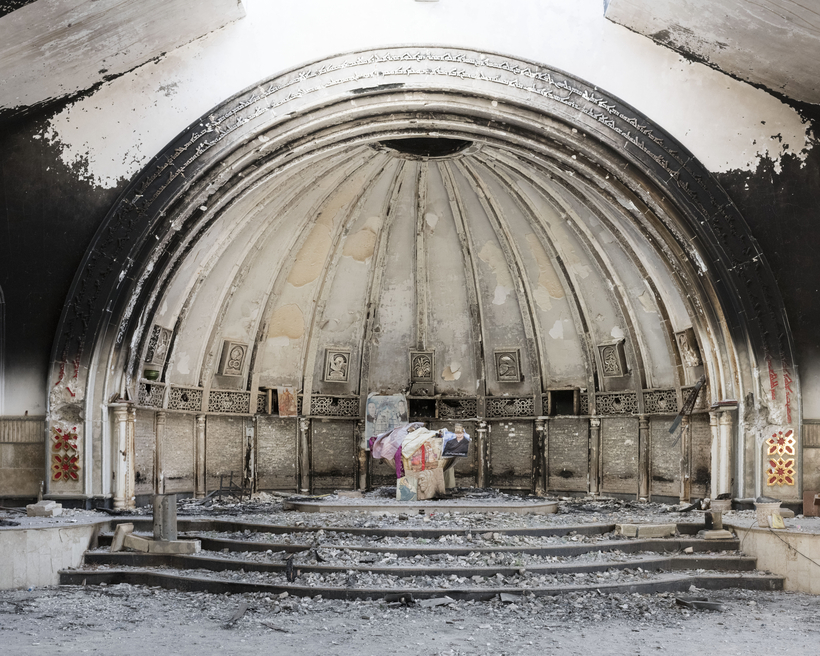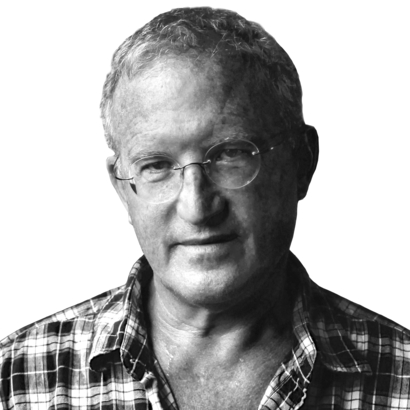Since we presume to be a democracy, perhaps we ought to require all high-school students to read at least one book about a country the United States has trashed. There are plenty to choose from—countries and books.
I haven’t read all of those written about Iraq, but I recommend this one, which covers the most recent of our grand foreign-policy misadventures. In order to fully appreciate the folly of American intentions in 2003, high schoolers today would have to be told about the fantasy of jubilant Iraqi citizens blowing kisses and strewing petals in the path of U.S. Army 3rd Infantry Division tanks as they rolled triumphantly into Baghdad after overthrowing dictator Saddam Hussein. They should also watch President George W. Bush’s “Mission Accomplished” speech on the deck of the U.S.S. Abraham Lincoln.
These are needed to properly frame Verini’s harrowing accounts from the front lines of the sheer mayhem still unfolding 13 years on. Writing for various magazines, he spent substantial portions of 2016 and 2017 traveling with Iraqi and Kurdish forces as they battled, in a decidedly makeshift fashion, the fleeing remnants of ISIS in northern Iraq. The demons unleashed by the American invasion tore the country apart and then spilled nightmare into neighboring Syria, adding to the misery of that nation’s civil war.
On the Ground
The value of the work of intrepid journalists such as Verini is to humanize these distant places, known to most Americans only as names on a map or as fleeting images of tanks and explosions. With a good writer, a thousand words are worth far more than a picture. An image can never fully convey the meaning of an aerial assault on a village, of a mortar round exploding in a neighborhood market, of what it means for death, dismemberment, and unthinkable cruelty to become commonplace, and how profoundly war shatters decency, community, and family. Most war reporters pay short visits to the front lines, grabbing images and stories that shock us and, at their best, sketch a few details of the larger story. Great ones, like Verini, immerse you in the danger and horror and thrill and black comedy of these places with novelistic detail. You may think you know something about the effort to uproot ISIS from Mosul and its surrounding villages, but until you have read something like this, you don’t.
An image can never fully convey what it means for death, dismemberment, and unthinkable cruelty to become commonplace.
Verini is a skilled observer, good listener, and terrific writer. He also thinks about what he has seen and works creatively to make sense of it. I was struck by his insight into the sheer boredom of life in the short-lived caliphate —“mind-emptying, rage-inducing, afterlife-inviting boredom. Between the bouts of violence and prayer and painting things black, there was absolutely nothing to do.” He writes with calm, preternatural fairness, taking the good with the bad, as in this description of an American volunteer medic he recognized at work in a carport in Gogjali:
Like most of the volunteers, he was a loud buffoon, whom you could find by night drunkenly mouthing off in the hotel bars back in the Kurdish city of Irbil, where the journalists and aid workers and other hangers-on lived, but he was a large-hearted, loud buffoon, and devoted, and he saved a lot of lives in that carport.
Verini describes the effects of the fighting on smaller cities around Iraq with deadpan ingenuity:
Qayara survived all right, Hit could be salvaged. Baiji, however, looked to have been inhaled off the earth by some vengeful deity. I drove through it one afternoon and didn’t register there had been a city there.
“How far are we from Baiji?” I asked my translator.
“That was Baiji,” he said.
There are indelibly colorful characters, such as the Kurdish fighters who pause during firefights to pose for group selfies; Shia militiamen who “looked as though they’d been kitted out at some urban unisex martial athleisure boutique,” and who “paid as much attention to their hair as any Prussian cavalry officer”; and Abu Omar and his son, Omar, whom he openly berates as dim-witted but who turns out to be bright and articulate … and to have been an active member of ISIS before it became wise to play dumb and disavow the cause. There’s Major Hassan, who “looked like someone’s chipper younger brother, short, chubby, with jolly cheeks like big ripe apricots. He smoked his cigarettes from a long, dandyish plastic filter tip” and took daily phone calls from his mother, who wanted to know if he’s been eating and sleeping well. There’s General Abdulwahab al-Saadi:
He was tall, taciturn, exquisitely aloof, handsome in that universal military way—rectangular of skull, lantern of jaw, with a permanently folded brow and perfectly graying curly flattop, as though a portraitist was overseeing his aging. Shelby Foote once described a Civil War general’s expression in photographs as looking as though “he were dictating terms for the camera’s surrender.”
This is the great material in his book. I was less taken with the passages interpreting the long and violent history of the region and of the war, which are there to bulk up what was originally magazine-article-length reportage, but they demonstrate admirable research and able synthesis. Verini’s long psychoanalysis of jihadism, and of Abu Bakr al-Baghdadi, the founder of ISIS, depicted as ultimately suicidal and self-hating, is inventive but not entirely convincing. What is remarkable about the book is the simple fact that Verini risked his hide to experience and describe the war. It’s exceedingly dangerous work that few undertake so seriously, and that fewer still can write about so well.
American Presence
Just offstage are American troops, who are lethal, extremely professional, and mostly silent:
It was never clear who they were, whether SEALs, Green Berets, Army Delta, or something else. They wore no unit insignia nor rank indicators and no one was going to ask … mid-to-late thirties, rangy, nimble, watchful, reproachful, bearded, bearded with beards that seemed to grow as much from their modified MP5 and SR-25 rifles as their faces, beards with their own air of predation. They didn’t acknowledge you aside from an expressionless glance, maybe a quarter-inch nod if they understood you to be American.
What is remarkable about the book is the simple fact that Verini risked his hide to experience and describe the war.
Americans are the great power and mystery behind all the bloodletting. It was America, after all, that kicked off the war, and America that now coolly oversees it—mostly from a distance. Verini captures brilliantly the attitudes of Iraqi and Kurdish fighters toward these deadly, seemingly all-powerful allies. To some they are not just to blame for the blossoming of deadly sectarianism and ISIS; they are the hidden hand behind everything. Some believe that ISIS itself was an American creation, which requires a level of reasoning too subtle for even its adherents to grasp: “And that’s precisely what made America so brilliant. It controlled both sides of this war, just as it did every other war.”
This is a belief I have encountered myself when traveling in places violently upended by America, where our nation is perceived, as Verini aptly puts it, with “respect and suspicion, betrayal and gratitude, grievance and awe.” Like the Old Testament God, America is less beloved than feared, and respected precisely because it is feared. This is not a wholly bad thing, but it’s hardly what most Americans envision when our brave troops sally forth in the name of freedom and self-determination.
Don’t expect to be loved and admired, and don’t expect things to turn out as planned. It’s a lesson we ought to learn, and teach.
Mark Bowden is the author of Black Hawk Down, Killing Pablo: The Hunt for the World’s Greatest Outlaw, and, most recently, The Last Stone


